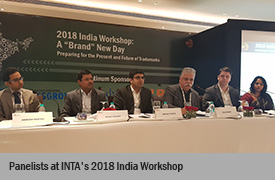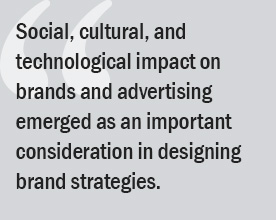A ‘Brand’
Published: April 15, 2018
 With Indian brands increasingly expanding into the global marketplace, and India making it to the top five countries in the world for number of trademark filings, New Delhi was an apt location for INTA’s 2018 India workshop, “Preparing for the Present and Future of Trademarks.”
With Indian brands increasingly expanding into the global marketplace, and India making it to the top five countries in the world for number of trademark filings, New Delhi was an apt location for INTA’s 2018 India workshop, “Preparing for the Present and Future of Trademarks.”
The workshop, held on March 14, marked the first day of INTA’s 2018 Annual Delegation to India. During the welcome address, INTA CEO Etienne Sanz de Acedo noted that the theme of the conference resonated with the three main directions of INTA’s 2018‒2021 Strategic Plan: promoting trademarks and brands; reinforcing consumer trust; and embracing innovation and change. Tish Berard (Hearts On Fire Company, LLC, USA), INTA 2018 President, said “India is currently undergoing a transformation from a manufacturing center to a hub of innovation, production, creation, and international influence. For this transformation to be effective on a global scale, strong brands are essential and must be supported by foreign trademark filings and protection.”
Ms. Berard added that the rise of Indian brands is also being fueled by innovative leadership and a spirit of optimism, noting the resilience and adaptability Indian brands have demonstrated to disruptions in the market, their enhanced global reach, and their increased brand value.
The workshop included vibrant discussions on how brands and businesses can adapt to rapidly changing social, technological, and cultural landscapes both locally and globally.
The sessions brought out new and unique legal issues that are being faced by new tech and e-commerce companies in the context of increasingly blurred lines between virtual and brick and mortar companies and online retail companies crossing over from being “pure” intermediaries to having a mixed retailer-intermediary business model.
The exponential increase in online infringement and piracy has been a growing cause of concern for brand owners as well as e-commerce businesses. Speakers shared the practices being adopted by e-commerce businesses to deal with the issue of online piracy, including seller-blacklisting policies, take-down policies, and screening policies. Hemant Singh (Inttl Advocare, India) highlighted the differences between online piracy and offline piracy, pointing out the challenges that arise due to the anonymity afforded by the virtual world.
 Social, cultural, and technological impact on brands and advertising emerged as an important consideration in designing brand strategies, particularly in a country like India, which has 22 major languages and several thousand dialects. Nandita Khurana (Michelin, India) shared how Michelin gained market share in India by adapting its products to local market conditions and recalibrating its advertising to better connect with Indians culturally and emotionally.
Social, cultural, and technological impact on brands and advertising emerged as an important consideration in designing brand strategies, particularly in a country like India, which has 22 major languages and several thousand dialects. Nandita Khurana (Michelin, India) shared how Michelin gained market share in India by adapting its products to local market conditions and recalibrating its advertising to better connect with Indians culturally and emotionally.
The workshop was attended by roughly 130 registrants, 47 of whom were corporate. Sameer Guha (Mars International, India) summed up the benefits of the workshop with some words of advice to his fellow corporate registrants. “As in-house counsel, you are expected to bring not just legal knowledge, but strategic knowledge and expertise. You gain that strategic knowledge and expertise by attending conferences such as this, which expose you to developments in technology, brand protection, and what is happening in the intellectual property space.”
Although every effort has been made to verify the accuracy of items in the INTA Bulletin, readers are urged to check independently on matters of specific concern or interest. Law & Practice updates are published without comment from INTA except where it has taken an official position.
© 2018 International Trademark Association